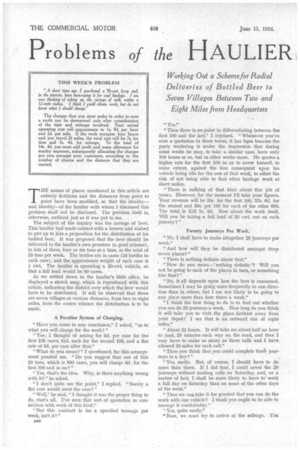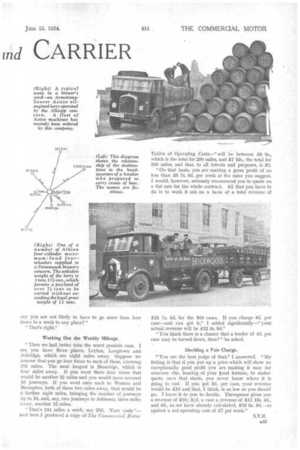Problems of the HAULIER md CARRIER T HE names of places
Page 58

Page 59

If you've noticed an error in this article please click here to report it so we can fix it.
mentioned in this article are entirely fictitious and the distances from point to point have been modified, so that the locality— and identity—of the haulier with whom I disciissed this problem shall no be disclosed. The problem itself is, otherwise, outlined just as it was put to me. .
The subject of the inquiry was the cartage of beer. This haulier had made contact with a brewer and wished to put up to him a proposition for the distribution of his bottled beer. It was proposed that the beer should be delivered to the haulier's own premises (a good scheme), in lots of three, four or six tons at a time, to the total of 20 tons per week. The bottles are in cases (24 bottles to each case), and the approximate weight of each case is i cwt. The haulier is operating a 30-cwt. vehicle, so that a full load would be 60 cases. '
As we settled down in the haulier's little office, he displayed a sketch map, which is reproduced with this article, indicating the district over which the beer would have to be distributed. It will be observed that there are seven villages at various distances, from two to eight miles, from the centre whence the distribution is to be made.
A Peculiar System of Charging.
"Have you come to any conclusion," I asked, "as to what you will charge for the work?"
"Yes; I thought of asking for 6d. per case for the first 100 cases, 44c1. each for the second 100, and a flat rate of 3d. per case after that."
"What do you mean?" I questioned, for this arrangement puzzled me. "Do you suggest that out of this 20 tons, which is 800 cases, you will charge 6d. for the first 100 and so on?"
"Yes, that's the idea. Why, is there anything wrong with it?" he asked.
"I don't quite see the point," I replied. "Surely a flat rate would meet the case?"
"Well," he said, "I thought it was the proper thing to do, that's all. I've seen that sort of quotation in connection with work of this kind."
"But this contract is for a specified tonnage per week, isn't it?"
1344
yes.”
"Then there is no point in differentiating between the first 100 and the last," I rejoined. "Whenever you've seen a quotation in those terms, it has ben because the party tendering is under the impression that during some weeks he may, to take a similar case, have only 300 boxes or so, but in other weeks more. He quotes a higher, rate for the first 100 so as to cover himself, to some extent, against the loss consequent upon his vehicle being idle for the rest of that week, to offset the risk of not being able to find other haulage work at short notice.
"There is nothing of that kind about this job of yours. However, for the moment I'll take your figures. Your revenue will be 50s. for the first 100, 37s. 6d. for the second and 305. per 100 for each of the other 600. The total is 13 7s. 6d. Now about the work itself. Will you be taking a full load of 30 cwt. out on each journey?"
Twenty Journeys Per Week.
"No, I shall have to make altogether 20 journeys per week."
"And how will they be distributed amongst these seven places?"
"There is nothing definite about that."
"How do you mean—' nothing definite '? Will you not be going to each of the places in turn, or something like that?"
" No, it all depends upon how the beer is consumed. Sometimes I may be going more frequently in one direction than in others, but I am not likely to be going to any plaze more than four times a week."
"I think the first thing to do is to find out whether you can do 20 journeys a week. How long do you think it will take you to visit the place farthest away from your depot? I see that is an outward run of eight "About 2i hours. It will take me about half an hour to load, 20 minutes each way on the road, and then I may have to make as many as three calls and I have allowed 20 miles for each call."
"Then you think that you could complete three journeys in a day?"
"Yes, easily. But, of course, I should have to do more than three. If I did four, I could cover the 20 journeys without making calls on Saturday, and, as a matter of fact, I shall be more likely to have to work a full day on Saturday than on some of the other days of the week."
"Then we call. take it for granted that you can do the work with one vehicle? I think you ought to be able to manage it comfortably."
"Yes, quite easily." I
"Now, we must try to arrive at the mileage. You say you are not likely to have to go more than four times in a week to any place?" "That's right."
Working Out the Weekly Mileage.
"Then we had better take the worst possible case. I see you have three places, Leyton, Longtown and Ashridge, which are eight miles away. Suppose we assume that you go four times to each of these, covering 192 miles. The next longest is Beroridge, which is four miles away. If you went there four times that would be another 32 miles and you would have covered 16 journeys. 11 you went once each to Weston and Brompton, both of them two miles away, that would be a further eight miles, bringing the number of journeys up to 18, and, say, two journeys to Ashtown, three miles away, another 12 miles.
"That's 244 miles a week, say 250. Your costs "— and here I produced a copy of The Commercial Motor
Tables of Operating Costs—" will be between £6 Ss., which is the total for 200 miles, and £7 10s., the total for 300 miles, and that, to all intents and purposes, is £7.
"On that basis, you are making a gross profit of no less than LEI 7s. 6d. per week at the rates you suggest. I would, however, seriously recommend you to quote on a flat rate for the whole contract. All that you have to do is to work it out on a basis of a total revenue of £13 7s. 6d. for the 800 cases. If you charge 4d. per case—and can get it," I added significantly—" your actual revenue will be £13 Os. 8d."
"You think there is a chance that a tender of 4d. per case may be turned down, then?" he asked.
Deciding a Fair Charge.
"You are the best judge of that," I answered. "My feeling is that if you put up a price which will shOw an exceptionally good profit you are making it easy for someone else, hearing of your t,00d fortune, to underquote, once that starts, you never know where it is going to end. If you got 3d. per case, your revenue would be £10 and that, I think, is as low as you should go. I leave it to you to decide. Threepence gives you a revenue of £10; 31d. a case a revenue of £11 13s. 4d., and 9d., as we have already calculated, £13 Os. 8d.--as against a net operating cost of £7 per week."
S.T.R.




























































































